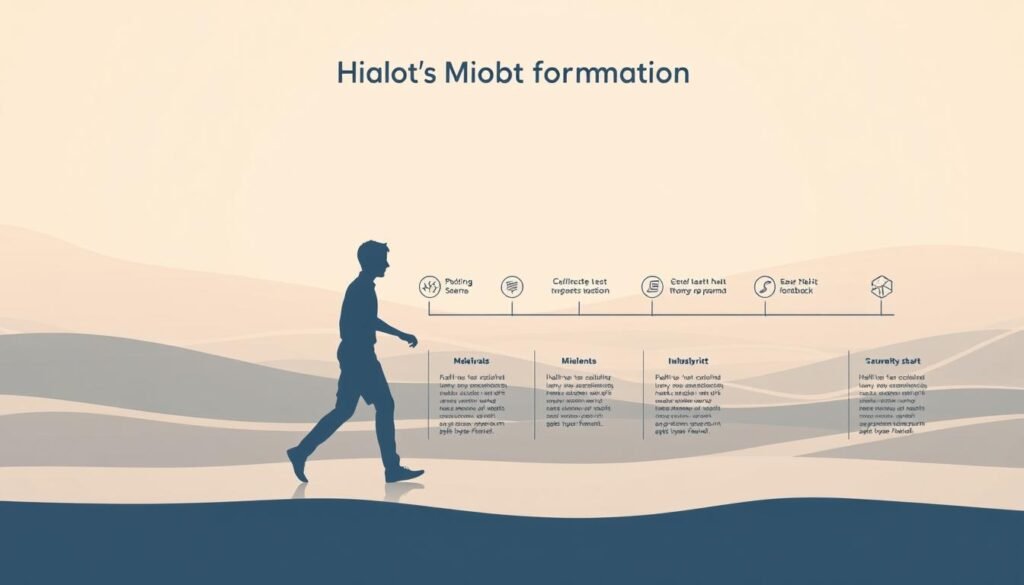Ever start a new daily plan full of energy, only to lose steam by week two? You’re not alone. Crafting sustainable habits isn’t about willpower—it’s science. Habit formation relies on a three-step cycle: triggers, actions, and rewards. When repeated, this loop becomes automatic, turning effort into effortless daily wins.
Mornings are your secret weapon. Research shows early hours shape your entire day. A structured start boosts focus, energy, and resilience. But here’s the twist: you don’t need to be an early riser to benefit. Whether you’re a sunrise enthusiast or a snooze-button survivor, the right approach works for everyone.
This guide cuts through the noise. We’ll share research-backed strategies used by top performers, from CEOs to athletes. Forget rigid schedules or drastic changes. Small, intentional steps—like hydrating first thing or moving your body—create ripple effects. Consistency beats intensity every time.
Key Takeaways
- Habits form through cues, actions, and rewards—not sheer willpower
- Morning habits create momentum for better days
- Simple, repeatable actions outperform complex plans
- Progress compounds over weeks, not overnight
- Anyone can succeed with personalized strategies
Understanding the Importance of a Morning Routine
Your first waking hours act like a steering wheel for the next 16. Structured mornings create a domino effect of better choices. Neuroscience reveals that early decisions shape willpower reserves—making intentional starts crucial for lasting success.
Benefits for Wellness and Productivity
Consistent morning patterns reduce decision fatigue by 31%, according to Journal of Behavioral Studies research. This mental clarity helps tackle complex tasks before noon. Physical benefits stack up too—hydration and movement boost metabolism by 12-15%.
Emotional stability grows when mornings include mindfulness. One study showed 22% lower stress levels in people who journaled or meditated early. These practices build resilience against daily pressures.
How a Well-Crafted Routine Sets Your Day
Purposeful mornings create psychological ownership of your time. Completing personal priorities first—like exercise or learning—fuels confidence. This momentum carries into work projects and relationships.
| Structured Morning | Unstructured Morning |
|---|---|
| Lower stress spikes | 37% higher cortisol levels |
| Faster task completion | 2x more decision delays |
| Consistent energy flow | Afternoon crashes |
Balance emerges when you address personal needs before external demands. Even 15 minutes of reading or stretching creates protective boundaries. Over weeks, these micro-wins compound into life-altering habits.
Getting a Good Night’s Sleep for a Productive Morning
Did you know your morning energy starts with last night’s choices? Over 35% of adults sleep fewer than seven hours, leaving them drained before the day begins. Quality rest isn’t accidental—it’s built through intentional evening habits that prime your body and mind for success.
Establishing a Relaxing Night Routine
Wind down like you’re dimming a light switch. Start with calming activities 90 minutes before bed: warm baths lower core temperature, while paper books reduce mental clutter. Avoid intense workouts or screen scrolling—both trick your brain into “go mode” instead of rest mode.
Preparing Your Mind and Body for Rest
Your bedroom should feel like a sleep sanctuary. Ban phones and tablets—their blue light slashes melatonin by 23% within two hours. Try blackout curtains and 65°F room temps for deeper sleep cycles. Consistent routine timing trains your body’s internal clock, making wake-ups feel natural.
| Optimal Sleep Setup | Common Mistakes |
|---|---|
| Dark, cool room | TVs in bedroom |
| No screens 1hr before bed | Late caffeine intake |
| Relaxing pre-sleep rituals | Inconsistent bedtimes |
Small tweaks yield big results. People with device-free bedrooms fall asleep 28% faster. Pair this with herbal tea instead of late snacks, and you’ll greet morning sunlight feeling recharged, not groggy.
Skip the Snooze Button: Creating Consistency in Your Wake-Up
That extra nine minutes of sleep? It’s actually stealing your day. Fragmented snooze sessions trick your brain into restarting sleep cycles, leaving you 31% groggier than if you’d risen at the first alarm. Micro-naps disrupt deep rest, making your body crave more shuteye instead of energizing you.
Power Moves for Instant Action
When your alarm blares, try the five-second rule: count backward from five, then swing your legs out of bed. This mental hack overrides hesitation by triggering immediate movement. Cold floors? Keep cozy slippers within arm’s reach—comfort removes one more excuse to linger.
Place your alarm clock across the room. Forcing yourself to stand up breaks the snooze cycle physically. Pair this with preset coffee makers—the smell of fresh brew becomes a sensory reward for getting up. “I earned this” thinking builds momentum for other daily wins.
Consistency trains your brain to trust your commitments. People who ditch snoozing report 40% fewer afternoon energy crashes. Struggling some days? Try sunrise-simulator alarms or team up with a friend for mutual accountability. Progress, not perfection, rewires your wake-up wiring.
Implementing How to Build a Morning Routine That Lasts
Creating lasting habits isn’t about willpower—it’s about wiring your brain’s autopilot. The magic happens when triggers, actions, and rewards work together like clockwork. Start small: choose one keystone habit to anchor your day.

Step-by-Step Routine Formation
Pick a simple action you can do daily without resistance. Brushing your teeth? Add 30 seconds of stretching right after. Over two weeks, layer new habits using existing triggers. Morning coffee becomes your cue to journal three gratitudes while it brews.
Understanding Cue, Routine, and Reward
Your brain craves patterns. A sunrise alarm (cue) could prompt five minutes of deep breathing (routine), followed by the satisfaction of lowered stress (reward). These connections strengthen through repetition—like muscle memory for your day.
| Cue Examples | Routine Ideas | Reward Types |
|---|---|---|
| Alarm sound | Drink water | Fresh energy boost |
| First sip of tea | Plan priorities | Clear mental focus |
| Shoes by bed | 10-minute walk | Endorphin rush |
Struggling? Adjust timing or swap rewards. Hate morning meditation? Try upbeat music while making breakfast instead. Consistency matters more than perfection—miss a day? Just restart tomorrow.
Hydration and Breakfast: Kickstarting Your Energy
Your body is a morning engine—what you fuel it with first determines your day’s mileage. After 7-9 hours without fluids, your cells crave hydration more than caffeine. Water jumpstarts metabolism 20% faster than waiting until lunch, research shows.
Drinking a Full Glass of Water
Reach for that glass before your feet hit the floor. Overnight dehydration slows brain function by 15%—water reverses this instantly. Try keeping a filled bottle bedside. Three benefits emerge:
- Flushes toxins accumulated during sleep
- Prepares your gut for breakfast absorption
- Balances electrolytes for steadier energy
Wait 30 minutes after drinking before coffee. This gap prevents caffeine’s dehydrating effects from canceling water’s benefits.
Preparing a Healthy Breakfast on the Go
Your first meal sets your blood sugar rhythm. Healthy breakfast choices needn’t be complicated:
- Overnight oats with chia seeds (prep Sunday)
- Hard-boiled eggs + avocado toast
- Greek yogurt parfaits in mason jars
No appetite? Start small—a banana with almond butter provides quick fuel. Meal prep containers turn rushed mornings into grab-and-go wins. Remember: “Eating within 90 minutes of waking boosts focus by 40%”, per Nutrition Journal studies.
Incorporating Self-Care and Exercise Into Your Routine
Balancing movement and mindfulness in the early hours isn’t luxury—it’s science-backed strategy. Pairing physical activities with intentional care rituals creates a powerhouse combo for sustained energy and emotional resilience.

Movement That Meets You Where You Are
Your body thrives on variety. Low-impact options like yoga flows or brisk walks work wonders for newbies. Seasoned movers might prefer kettlebell circuits or dance workouts. Even 7 minutes of bodyweight exercise triggers mood-boosting endorphins.
Strapped for time? Try “stacking” habits: stretch while coffee brews or do calf raises during toothbrushing. Consistency beats duration—research shows daily 10-minute sessions improve focus better than sporadic hour-long gym trips.
Nourishing Your Inner Spark
Self-care anchors your mental space before outside demands hit. Try these quick wins:
- 60-second gratitude journaling
- Applying scented lotion during deep breaths
- Savoring tea while visualizing your best self
These micro-rituals activate relaxation responses. One study found people who practiced morning skincare routines reported 19% higher stress resilience.
Combine both worlds with mindful movement. A yoga flow that includes intention-setting poses bridges physical and emotional balance. Remember: your routine should feel like a gift, not a chore. Miss a day? Simply begin again tomorrow—progress lives in the restart.
Mindfulness, Affirmations, and Meditation for Focus
Your thoughts at dawn shape your entire day’s narrative. Neuroscience reveals that morning mental patterns influence emotional stability and decision-making for the next 12-14 hours. Simple practices rewire your brain’s default responses, turning reactive stress into proactive clarity.
Creating Positive Affirmations
Affirmations work best when they’re specific and present-tense. Instead of vague statements like “I’ll try my best,” say:
- “My focus sharpens with each breath I take”
- “Challenges strengthen my problem-solving skills”
- “I attract opportunities aligned with my goals”
Repeat these while brushing teeth or brewing coffee. Pair them with physical actions—touching a smooth stone or standing tall—to deepen neural connections.
Effective Meditation Techniques for Clarity
Start with bite-sized sessions. The 4-7-8 breathing method delivers calm in minutes:
- Inhale quietly for 4 counts
- Hold breath for 7 counts
- Exhale completely for 8 counts
Apps like Calm offer 10-minute guided sessions matching your goals: stress reduction or creative boosts. “Meditation isn’t about emptying your mind—it’s observing thoughts without judgment,” explains a Harvard mindfulness study.
Struggling to sit still? Try walking meditations while noticing textures underfoot or sounds around you. Consistency matters more than perfection—even 90 seconds daily builds mental resilience.
Setting Priorities: Organizing Your Day with To-Do Lists
Your morning power hour isn’t complete without a battle plan. Dedicate morning time to task review after self-care rituals—this mental shift prepares you for professional demands. Whether scribbling in a to-do list or tapping apps like Todoist, capturing what matters clears mental clutter and sharpens focus.
Strategies to Plan and Prioritize
Start by brain-dumping every task without filtering. Then apply the 1-3-5 rule: one big win, three medium efforts, five quick actions. Color-code work items by urgency—red for “today,” yellow for “this week,” green for “delegate.”
Digital tools like Trello turn to-do lists into automated workflows, saving time on repetitive tasks. Schedule demanding work during peak energy windows—usually 90 minutes after waking. End your planning routine by circling the single non-negotiable for the day.

![[How to Build a Morning Routine That Lasts]](https://upgrademyfocus.com/wp-content/uploads/2025/07/How-to-Build-a-Morning-Routine-That-Lasts.jpeg)